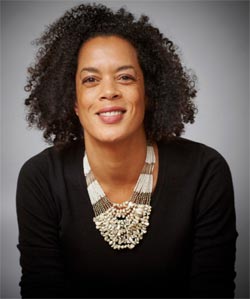Below are the beginning paragraphs from an essay by the author Aminatta Forna in the magazine World Literature Today. You can read the complete essay here.
Human beings tell stories. This is a fact. Every society, however differently organized and structured, whether founded on the values of matriarchy or patriarchy, whether agricultural, sea-going, peaceful, or warmongering, tells stories. We know this because anthropologists tell us so. Anthropologists, historians (what are historians but storytellers themselves?), and archaeologists, who have traced the origin of stories as far back as human life. The first written story to have been found is the Epic of Gilgamesh, produced sometime between 2150 and 1400 bc in cuneiform on fragments of tablets and unearthed in the sands of what is now Syria.
 From epic legends like Gilgamesh to anecdotes, we tell each other stories every day: “Guess what happened?” Typically my seven-year-old son’s first words when he dashes through the door at the day’s end. A woman is late for lunch with a friend, she sits down, she says: “Just listen to the day I’ve had . . .” A man at a bar leans across to another man: “So I was driving down the freeway . . .” And so it goes. Storytelling is a symbiotic process, an exchange between teller and listener, between writer and reader. It is the way my son shares the highs and lows of his day, the way the woman who is late encourages her friend’s sympathy rather than irritation, how the man at the bar extends the hand of friendship.
From epic legends like Gilgamesh to anecdotes, we tell each other stories every day: “Guess what happened?” Typically my seven-year-old son’s first words when he dashes through the door at the day’s end. A woman is late for lunch with a friend, she sits down, she says: “Just listen to the day I’ve had . . .” A man at a bar leans across to another man: “So I was driving down the freeway . . .” And so it goes. Storytelling is a symbiotic process, an exchange between teller and listener, between writer and reader. It is the way my son shares the highs and lows of his day, the way the woman who is late encourages her friend’s sympathy rather than irritation, how the man at the bar extends the hand of friendship.
It is easy to revere stories for all that they do. Today I know how it might have felt like to live under apartheid from Can Themba, how daily life unfolds during the civil war in Lebanon from Rabih Alameddine, sense the fear and courage of the enslaved from Colson Whitehead. Through books I can travel across distance, space, and time. I can imagine what it is like to be a man, or an elderly person, or recapture the experience of youth. It helps me understand the worlds of other people. Indeed, the link between reading fiction and empathy has been well established, most recently by researchers at the New School who have found evidence that literary fiction improves a reader’s capacity to understand what others are thinking and feeling. More than that, reading literary fiction—and interestingly the same doesn’t go for nonfiction or genre fiction such as romances or thrillers— actually changes people’s behavior.
Literary fiction focuses on the psychology of characters and their relationships. The characters in literary fiction are as real as a writer can make them, as full of the conflicts and flaws as any one of us. Literary fiction seeks to ask questions rather than provide answers. The outcome may not be predictable. The New School research shows that literary fiction prompts the reader to imagine the characters’ introspective dialogues. This psychological awareness carries over into the real world, which is full of complicated individuals whose inner lives are usually difficult to fathom. Reading frees the reader from the constraints of the self, from our own prejudices and assumptions. Reading makes you a more highly functioning person. In other words—reading makes you a better person.